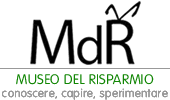
Most of us tend to see saving as a habit that is wise to include in our lifestyle, perhaps by making small changes to our purchasing methods, in order to enjoy, in the long run, greater financial peace of mind.
After all, we at the Museum of Saving have always told you that this is the way: a good practice for living better and achieving your life goals.
Today we want to focus on the other side of saving, when saving money becomes a real obsession.
Does the word “hyperopia” ring a bell? It is a term coined in the United States to identify the so-called “savings syndrome”.
American psychologists have named it this way because, just like in the case of visual impairment, this syndrome favors a long-term vision and prevents us from focusing on the present. In this case, however, the unit of measurement is not distance but, precisely, time.
How does this problem translate into money management? As is now known, psychology can influence our economic choices and people who suffer from hyperopia, and who experience saving as an obsession, are afraid of not having enough money set aside for the future
Hyperopia vs. Compulsive Shopping
Savings syndrome is the exact opposite of compulsive shopping.
People who suffer from it are in fact led to continually put money aside with a morbid attitude towards saving, depriving themselves of all those small concessions that could make their daily lives easier, because they are worried and anxious about not being able to cope with possible future expenses, even if they actually have enough money.
The result is therefore a present made of daily hardships and sacrifices, whether it is a coffee with friends, a pair of shoes or a weekend away, which can lead to unhappiness and, in extreme cases, even depression.
Obviously saving is one of the pillars of the correct management of our personal finances – it is no coincidence that at the Museum of Saving we recommend explaining this to our children from an early age – but allowing yourself nothing for fear of not being able to face any future unforeseen events and living with constant anxiety is certainly harmful.
As we have always explained, saving means setting aside money to make our dreams come true, a wise disposition in the management of money not to be confused with greed, that excessive restraint in spending and giving, due to a narrow attachment to money and what you own, which, in Catholic doctrine, represents one of the seven deadly sins!
Try for a moment to visualize Uncle Scrooge: have you ever seen him smiling and happy? No! And yet, he literally swims in gold! But money, if not recognized as a tool to make our life and that of people less fortunate than us more peaceful, does not give happiness! It only leads us to anxiety and isolation!
It is absolutely not wrong to give ourselves a gift every now and then to feel satisfied in the present!
As with other aspects of our life, the middle way seems to be the right path to take. A good and sensible management of our income and expenses, supported by a farsighted planning, can in fact help us to think about saving and money with serenity, indulging in some of our desires without being caught unprepared by a problem that arises tomorrow.
How to overcome hyperopia
To overcome the syndrome of saving, you must first become aware of the problem and its negative consequences on your well-being, and then undertake a path of personal empowerment through which you can reattribute money and saving their correct meaning and find the right balance.
A good practice could be to establish a budget for superfluous but comforting expenses, such as a dinner out or a new dress.
Even sharing expenses with other people can be liberating and make you feel less guilty, for example asking brothers or sisters to buy a gift for their parents together.
However, to improve our psychological well-being and establish a healthy relationship with our personal finances, it is essential to know the basics of financial education, which helps us gain the right confidence in our management skills and overcome fear of the future.
In this regard, we remind you that at the Museum of Saving it is possible to learn the basics of correct money management in a simple and fun way.
To learn more, visit our website and discover all the activities designed for adults and children.
